
Published:
Readtime: 9 min
Every product is carefully selected by our editors and experts. If you buy from a link, we may earn a commission. Learn more. For more information on how we test products, click here.
If you’ve ever Googled how much water you should drink each day, you’ll know the answer isn’t straightforward. While helpful, the typical “eight glasses” we learned in school can be offset by many factors, from the local climate to lifestyle characteristics, and even medical experts have conflicting opinions. That being said, your recommended daily water intake should be at least 2 litres. This will provide enough fluid to support daily activity, however, for those looking to bolster their hydration and receive the positive health benefits in the process, our following guide is an excellent resource. We don’t just recommend how much water to drink, but why you should drink it.

Does Drinking Water Help You Lose Weight?
According to recent studies, there is indeed a correlation between increased water consumption and weight loss. For starters, two studies concluded that drinking 500ml of water may provide a temporary boost to your metabolism. (1) They also found that drinking an estimated 2 litres helped shave off 96 calories per day.
Putting studies aside, water functions best as a dietary method when it’s consumed in lieu of excess calories. That is to say, drinking lots of water curbs your appetite, prompting you to eat less. When you eat less, you tend to lose weight. Meanwhile, pure water has zero calories so it won’t end up adding to your waistline. (2)
For that reason, you should drink lots of water throughout the day and directly before meals, in particular. Practice a healthy diet in tandem and you might very well shed pounds in the most natural way possible.
Last but not least, you might consider drinking cold water instead of room temperature water. That’s because some experts suggest your body will expend more calories by internally heating the cold water. True or not, who doesn’t love a cold glass of H2O on a hot day?
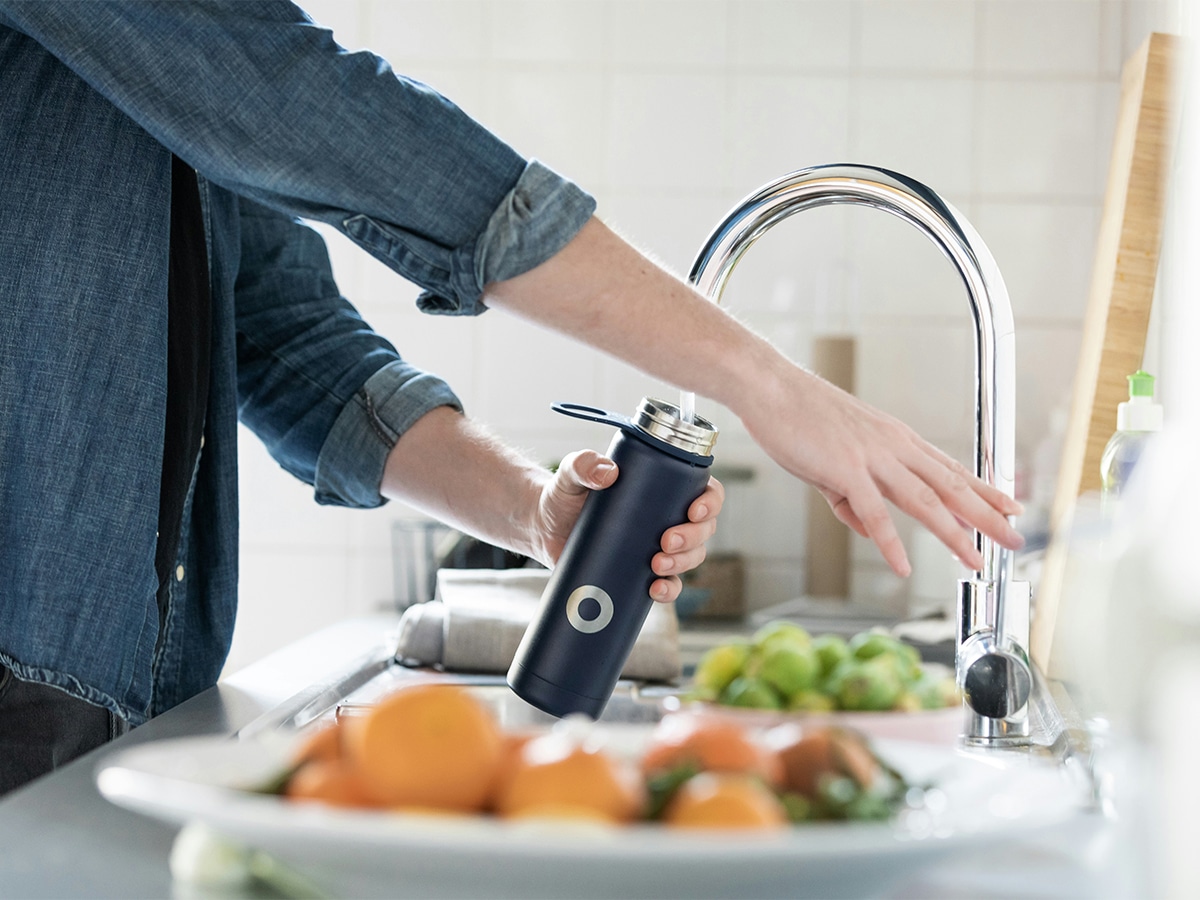
What Happens When You Start Drinking 2 Litres of Water Per Day?
As we stated above, how much water you should drink per day will vary from one person to the next. That said, a daily water intake of 2 litres (approximately 68 oz) makes for a terrific place to start and a recommended one at that. While not a cure-all, it has been associated with the following benefits:
- Helps alleviate both constipation and diarrhea – Constipation has been associated with dehydration in the colon and you should drink lots of water to keep the stool soft and mobile. Meanwhile, diarrhea can lead to dehydration so again it’s important to drink lots of water when you experience it. (3)
- Allegedly decreases the risk of certain cancers – It would be misleading to say that drinking water will help ward off cancer, as there’s no hard science to prove such a claim. However, some studies have concluded that increasing your daily water intake can lower your risk of bladder and colorectal cancer. What’s important is that you practice a healthy lifestyle, in general. (4)
- May decrease the risk of kidney stones – It’s been suggested that increased daily water intake can reduce your chances of getting kidney stones. Again, there’s no hard science to back up this claim. (5)
- May improve skin condition – Hydrating and moisturising the skin on the outside is known to reduce problems like acne and irritation. Does such a thing work from the inside out? Some people say it does. On the other hand, those same people aren’t scientists so take from their anecdotes what you will.
- Keeps you hydrated – Here’s one benefit that you don’t need a study to prove. By determining how much water to drink per day, you can avoid dehydration and its negative effects. Those effects can include lethargy, dry skin, dizziness, physical deterioration, and even death.
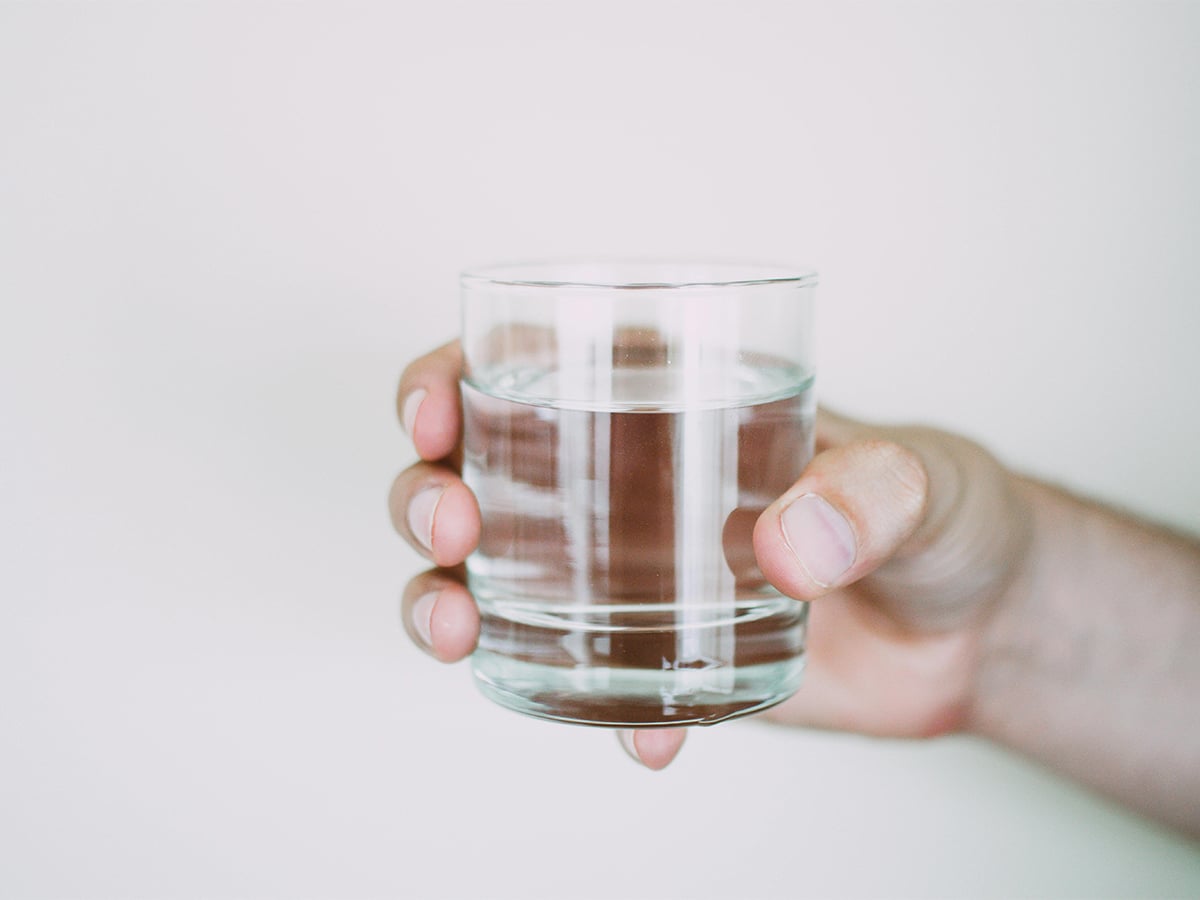
Common Questions About Drinking Water
Figuring out how much water you should drink per day is but one among a number of potential queries. Here are some other popular questions about water consumption:
Can You Drink Too Much Water?
While excess water is usually excreted through the kidneys, there is such a thing as overhydration. It can occur when you drink too much water, but also when factors such as heat or stress cause your kidneys to malfunction. In turn, your body starts to retain all the excess water and that can lead to health problems.
In some scenarios, overhydration will lead to water intoxication (aka water poisoning), which is when the excess water dilutes electrolytes in your blood. Should sodium levels drop too low, it can also result in a condition called “hyponatremia”. Potential risks include disruption to brain and body function, seizures, comas, and even death.
How Do You Know When You Need to Drink More Water?
Dehydration manifests itself by way of conspicuous symptoms, including dizziness, dry mouth, and headaches. Should you be feeling even slightly dehydrated, grab the nearest glass or bottle of water and start chugging (responsibly, that is).
Furthermore, you usually know when you’re thirsty and you shouldn’t ignore what your body is trying to tell you. This is especially true on hot days or after intense workouts, when you’re likely to sweat at a higher rate.
If possible, try to hydrate before you even feel thirsty. That’s because you want to avoid the slightest semblance of dehydration. Soon after you wake up, you should be kicking off your daily water intake.
Is There a Difference Between Thirst and Hydration?
From a technical perspective, thirst and hydration aren’t quite the same. Namely, hydration is the process of absorbing water in your body. Thirst is the sensation of wanting or needing more water. Dehydration, meanwhile, is a physiological condition that results when you don’t drink enough water.
How Can I Determine if I’m Drinking Enough Water?
If you rarely feel thirsty and your urine is either clear or light yellow, there’s a good chance you’re drinking enough water. Stick to a minimum daily intake of 2 litres, make up for any loss of fluids, and listen to what your body is telling you.
5. What Constitutes “Water?”
Everything from smoothies to sports drinks to coffee to beer delivers water into your system, but they also feature potential drawbacks. For instance, caffeinated beverages and alcoholic drinks can lead to dehydration by causing you to pee out more water than they brought in. As such, they’re not a valid source of hydration.
While sports drinks are indeed a source of both water and electrolytes (which can help with absorption), they can also contain excess calories, sugar, and sodium. Approach them in moderation and stick to regular water, for the most part.
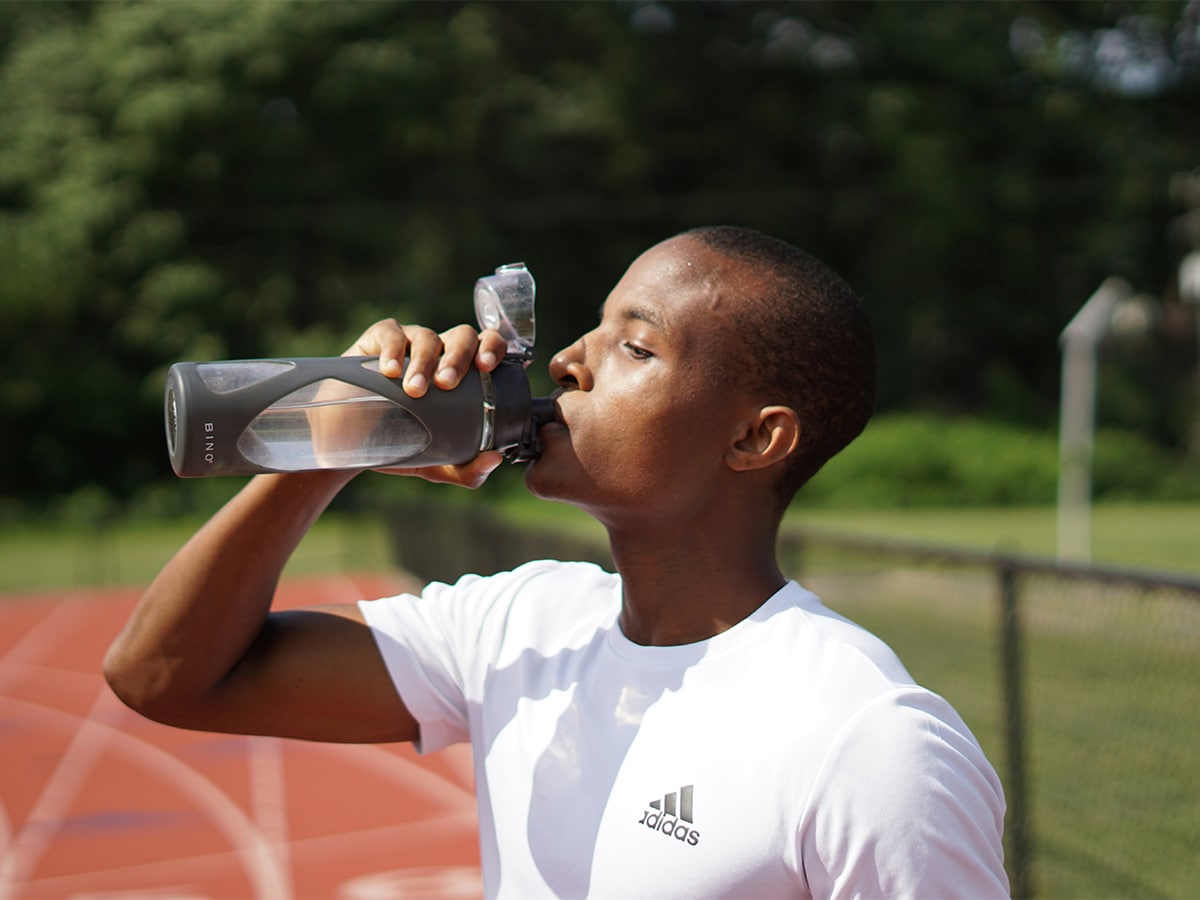
How Much Water is Ideal?
At long last, the question of the day: how much water should you drink? The recommended daily intake is about eight glasses of water per day at 8 oz per glass, which roughly translates to 2 litres. However, you should always take other variables into consideration. For instance, a breastfeeding woman should drink about 12 glasses per day to make up for the loss of fluids. By contrast, a 10-year-old boy can probably stick with the recommended intake of 2 litres.
For the sake of simplicity, consider the 8×8 rule as a baseline of sorts. If you generate an excessive amount of sweat or consume a lot of salt, you should probably drink more water per day. On the flip side of that coin, if you’re drinking 4 litres of water per day and then running to the bathroom every 10 minutes, you could probably stand to cut back.
In summary, aim for at least 2 litres of water per day and then supplement according to your personal lifestyle. When you feel thirsty, drink up. When you’re not thirsty, keep yourself hydrated but don’t go overboard. If possible, avoid caffeinated beverages and alcoholic drinks, which can lead to dehydration. Last but not least, use common sense and listen when you’re body is talking. And that’s how much water to drink.
Citations
- Boschmann M, Steiniger J, Hille U, Tank J, Adams F, Sharma AM, Klaus S, Luft FC, Jordan J. Water-induced thermogenesis. J Clin Endocrinol Metab. 2003 Dec;88(12):6015-9. doi: 10.1210/jc.2003-030780. PMID: 14671205.
- Çıtar Dazıroğlu ME, Acar Tek N. Water Consumption: Effect on Energy Expenditure and Body Weight Management. Curr Obes Rep. 2023 Jun;12(2):99-107. doi: 10.1007/s13679-023-00501-8. Epub 2023 Apr 10. PMID: 37036559.
- Sabine Nunes Boilesen, Soraia Tahan, Francine Canova Dias, Lígia Cristina Fonseca Lahoz Melli, Mauro Batista de Morais, Water and fluid intake in the prevention and treatment of functional constipation in children and adolescents: is there evidence?, Jornal de Pediatria, Volume 93, Issue 4, 2017, Pages 320-327, ISSN 0021-7557,
- Yair Bar David et al., Water Intake and Cancer Prevention. JCO 22, 383-385(2004). DOI:10.1200/JCO.2004.99.245
- Gamage KN, Jamnadass E, Sulaiman SK, Pietropaolo A, Aboumarzouk O, Somani BK. The role of fluid intake in the prevention of kidney stone disease: A systematic review over the last two decades. Turk J Urol. 2020 Nov;46(Supp. 1):S92-S103. doi: 10.5152/tud.2020.20155. Epub 2020 Jun 5. PMID: 32525478; PMCID: PMC7731957.
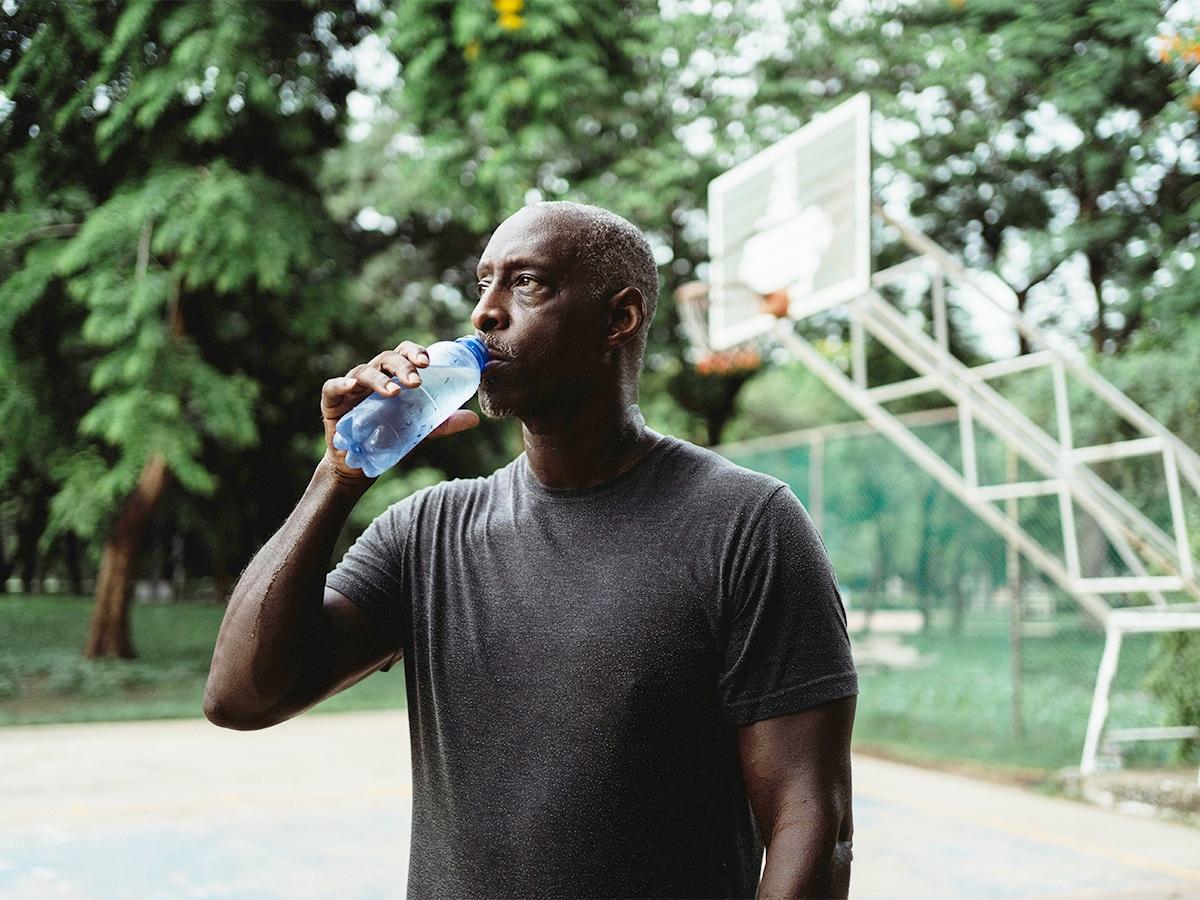

















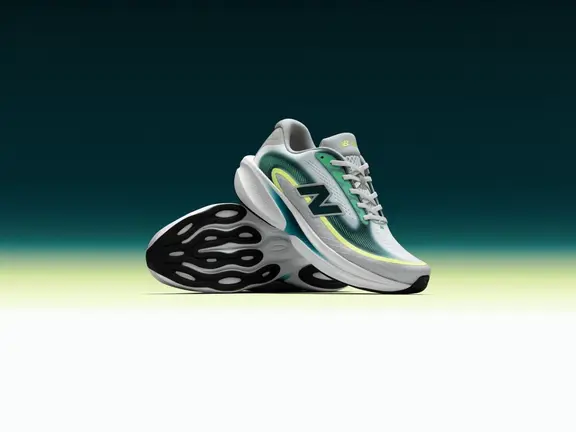










Comments
We love hearing from you. or to leave a comment.